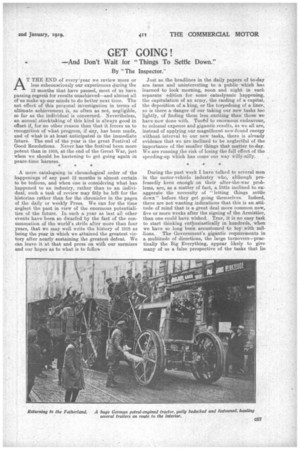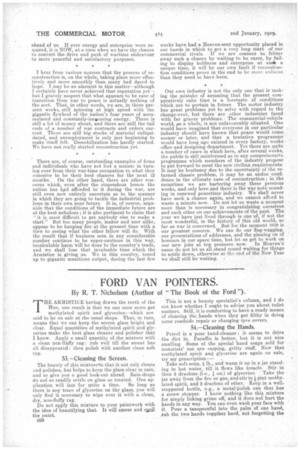• GET GOING!
Page 17

Page 18

If you've noticed an error in this article please click here to report it so we can fix it.
—And Don't Wait for "Things To Settle Down."
By. "The Inspector."
AT THE END of everyiyear we review more or less subconsciously our experiences during the 12 months that have passed, most of us have passing regretii for results unachieved—and almost all of us make up our minds to do better next time. The net effect of this personal investigation in terms of ultimate achievement is, as often as not, negligible, so far as the individual is concerned. Nevertheless, an annual .stocktaking of this kind is always good in effect if, for no other reason than that it forces us to recognition of what progress, if any, has been made, and of what is at least anticipated in the immediate future. The end of the year is the great Festival of Good Resolutions. Never has the festival been more potent than in 1918, at the end of the Great War, just when we should be hastening to get going again in peace-time harness.
A. mere cataloguing in chronological order -of the happenings of any past 12 months is almost certain to be tedious, and when one is considering what has happened to an industry, rather than to an individual, such a task of review may fitly be left for the historian rather than for the chronicler in the pages of the daily or weekly Press. We can for the time neglect the past in view of the enormous potentialities of the future. In such a year as last all other events have been so dwarfed by the fact of the consummation of the world's strife after more than four years, that we may well write the history of 1918 as being the year in which we attained the greatest victory after nearly sustaining the greatest defeat. We can leave it at that and press on with our snrmises and our hopes as to what is to folio's Just as the headlines in the daily papers of to-day are tame and uninteresting to a public which has learned to look morning, noon and night in each separate edition for some cataclysmic happening, the capitulation of an army, the raiding of a capital, the deposition of a king, or the torpedoing of a liner, so is there a danger of our taking our new tasks too lightly, of finding them less exciting than, those we have now done with. Tuned to enormous endeavour, to colossal expense and gigantic results, as we all are, instead of applying our magnificent new-found energy without interval to our new tasks, there is already evidence that we are inclined to be neglectful of the importance of the smaller things that matter to-day. We are running,the risk of losing the full effect of the speeding-up which has come our way Willy-nilly. • During the past week I have talked to several men in the motor-vehicle industry who, although professedly keen enough on their after-the-war problems, are, as a matter of fact, a little inclined to exaggerate the necessity of " letting things settle down" before they get going themselves. Indeed, there are not wanting indications that this is an attitude of mind that is a great deal more common now, five or more weeks after the signing of the Armistice, than one could have wished. True, it is no easy task to start thinking enthusiastically in hundreds, when we have so long been accustomed to toy with mil-lions. The Government's gigantic requirements in a multitude of directions, the large turnovers--practically the Big Everything, appear likely to give many of us a false perspective of the tasks that lie ahead of us. If ever energy and enterprise were required, it is NOW, at a time when we have the chance to convert the drive and push of wartime endeavour to more peaceful and satisfactory purposes.
I hear from various sources that the process of reconstruction is, on the whole, taking place more effectively and more smoothly than many had dared to hope. I may be an alarmist in this matter—although I certainly have never achieved that reputation yet-but I gravely suspect that what appears to be ease of transition from war to peace is actually nothing of the sort. That, in other words, we are, in these present weeks, still ipinning at high speed with the gigantic flywheel of the nation's four years of accumulated and constantly-incaeasing energy. There is still a lot of money about, and there are still the tail ends of a number of war contracts and orders current_ There are still big stocks of material unliquidated-, and unemployment is only just beginning to make itself felt. Demobilization has hardly started. We have not really started reconstruction yet.
There are, of course, outstanding examples of firms and individuals who have not lost a minute in turning over from their war-time occupation to what they conceive to be their best, chances for the next 12 months. On the other hand, there are other concerns which, even after the stineendous lesson the nation has hgd afforded to it during the war, are still even now entirely, uncertain as to the manner in which they are going to tackle the industrial problems in their own near future. It is, of course, arguable that the conditions of the immediate future are at the best nebulous ; it is also pertinent to claim that 'it. is most difficult to get anybody else to make a start." But too many people, maker and user alike, appear to be hanging fire at the present tune with a view to seeing what the other fellow will do. With the result that if business men in any considerable number continue to be super-cautious in this way, incalculable harm will be done to the country's trade, and we shall lose that invaluable time which the Armistice is giving us. We in this country, tuned up to gigantic munitions output, during the last few weeks have had a Heaven-sent opportunity placed in our hands in which to get a very long start of our commercial rivals. If we are content to. fritter away such a chance by waiting to be surer, by failing to display boldness and enterprise at wok a unique time, it will be our own fault if reconstruction conditions prove in the end to be more arduous than they need to have been.
Our own industry is not the only one that is making the mistake of assuming that the present comparatively calm time is a foretaste of conditions which are to pertain in future. The motor industry has great problems yet to solve with regard to the change-over, but there are other industries faced with far graver problems. The commercial-vehicle world, as a whole, is not unfavourably situated. One would have imagined that everyone in our particular industry should have known that peace would come sooner or later, and that a tentative programme would have long ago existed in every factory, works office and designing department. Yet there are quite a number of cases in which here, after several weeks, the public is still uninformed as to any comprehensive programme which members of the industry propose to put forward to meet the new civilian requirements. It may be hesitancy due to the uncertainty of the returned chassis problem, it may be an undue confidence in the ultimate ease of reconstruction ; in the meantime we are bartering away these precious weeks, and only here And there is the war note sounding in renewed peacetime industry. We shall never have such a chance again, and we cannot afford to waste a minute now. Do. not let us waste a moment more than is necessary in congratulating ourselves and each other on our achievements of the past. The year we have just lived through is one of, if not the most wonderful, in the history of this old world; so far ELS war is concerned. But for the moment 1919 is our greatest concern. We can do our flag-wagging, our presentations of addresses, and the pinning on of honours in our spare time, but let us get to work on our new jobs at top pressure now. In Heaven's name do not let us all stand round waiting for things to settle down, otherwise at the end of the New Year we shall still be waiting. .






















